On December 4th 2006, Kiai Kanjeng began their journey home to Indonesia. Emha and Novia however had other plans. They were due to attend a forum in Berlin arranged by the Indonesian embassy. Andrianto Handojo, a senior lecturer at Bandung’s prestigious Institute of Technology (ITB), currently residing in Berlin, wrote an interesting piece on the visit. Following is a translation.
On Mining the Potential of the Nation and Sustaining Love in Indonesia
Wednesday, 13th December 2006
Germany is now in the throes of winter. The sky is now more often clouded over and grey. Doors and windows are tightly shut and everyone is wearing thick clothes, but still, the shivering cold penetrates. Those Indonesians who are resident here or on short trips miss the sunshine, and they are happy when they meet one of their fellows who can tell them what’s been going on in Indonesia.
The wintry atmosphere cleared however as soon as Cak Nun addressed students, the Indonesian community and the leadership and staff of the Indonesian embassy in Berlin on 3 December 2006, in an event arranged by the Indonesian Students’ Association (PPI or Perhimpunan Pelajar Indonesia) in cooperation with the embassy.
From the perspective of personae before the public, those who have reached a half century or so in age will remember Indonesia’s great orator and proclaimer of the nation, Soekarno. Cak Nun caught the attention of the audience, sweeping those present along in his stream with a number of languages, songs and actions. At times they found themselves simply astonished, astounded. At others they were rolling up in guffaws of laughter at Cak Nun’s remarks and sharp analysis; so unexpected and unusual. The audience were nailed to their seats, though three hours flew by as no time. It was only the eventual lateness of the hour that brought proceedings to a halt, but even after the event was over people were doubtful; unsure whether they should really be going home now. They had been having such an experience it seemed a shame to allow things to break up.
It is somehow not sufficient to say that Cak Nun is an orator. Perhaps it would be more fitting to say that he is an actor who stages himself before an audience; one who has mastered the art of showmanship and performance. This is even more the case when the topics are as uniform as they were on that day. They ranged from the reaction of those who had suffered the Sidoarjo mud flow disaster, the increasing trend towards polygamy which is a newsworthy item at present and the humor of Gus Dur (or former president Abdurrahman Wahid), who received complaints about the controversial “drilling” dance moves of Inul (Daratista) and who, far from condemning her, proclaimed her actions as “experimental”.
So what was it about the occasion that lent it such an entertaining mood of satisfied enjoyment, in that warm room protected fom the temperatures outside which was not inclined to move much from 10 degrees or so? Was it enough for people to feel the warmth of laughter, good cheer and camaraderie?
Around a year before Cak Nun had also been in Berlin on a visit. One of the things he said at that time sounded something like:
"I’m Javanese. To my neighbours, I act and behave like a Javanese. But when I analyse, consider and act upon issues in Indonesia, I cannot merely act and behave like a Javanese. I must act and nehave like an Indonesian. And by extension, when I hear the complaints and problems of people from other countries, and when I think about their lives and problems there, I cannot merely act and behave like an Indonesian. I must become a citizen of the earth, a resident of the world.”
Contrast these words with what Cak Nun said on this occasion, which was something like:
On Mining the Potential of the Nation and Sustaining Love in Indonesia
Wednesday, 13th December 2006
Germany is now in the throes of winter. The sky is now more often clouded over and grey. Doors and windows are tightly shut and everyone is wearing thick clothes, but still, the shivering cold penetrates. Those Indonesians who are resident here or on short trips miss the sunshine, and they are happy when they meet one of their fellows who can tell them what’s been going on in Indonesia.
The wintry atmosphere cleared however as soon as Cak Nun addressed students, the Indonesian community and the leadership and staff of the Indonesian embassy in Berlin on 3 December 2006, in an event arranged by the Indonesian Students’ Association (PPI or Perhimpunan Pelajar Indonesia) in cooperation with the embassy.
From the perspective of personae before the public, those who have reached a half century or so in age will remember Indonesia’s great orator and proclaimer of the nation, Soekarno. Cak Nun caught the attention of the audience, sweeping those present along in his stream with a number of languages, songs and actions. At times they found themselves simply astonished, astounded. At others they were rolling up in guffaws of laughter at Cak Nun’s remarks and sharp analysis; so unexpected and unusual. The audience were nailed to their seats, though three hours flew by as no time. It was only the eventual lateness of the hour that brought proceedings to a halt, but even after the event was over people were doubtful; unsure whether they should really be going home now. They had been having such an experience it seemed a shame to allow things to break up.
It is somehow not sufficient to say that Cak Nun is an orator. Perhaps it would be more fitting to say that he is an actor who stages himself before an audience; one who has mastered the art of showmanship and performance. This is even more the case when the topics are as uniform as they were on that day. They ranged from the reaction of those who had suffered the Sidoarjo mud flow disaster, the increasing trend towards polygamy which is a newsworthy item at present and the humor of Gus Dur (or former president Abdurrahman Wahid), who received complaints about the controversial “drilling” dance moves of Inul (Daratista) and who, far from condemning her, proclaimed her actions as “experimental”.
So what was it about the occasion that lent it such an entertaining mood of satisfied enjoyment, in that warm room protected fom the temperatures outside which was not inclined to move much from 10 degrees or so? Was it enough for people to feel the warmth of laughter, good cheer and camaraderie?
Around a year before Cak Nun had also been in Berlin on a visit. One of the things he said at that time sounded something like:
"I’m Javanese. To my neighbours, I act and behave like a Javanese. But when I analyse, consider and act upon issues in Indonesia, I cannot merely act and behave like a Javanese. I must act and nehave like an Indonesian. And by extension, when I hear the complaints and problems of people from other countries, and when I think about their lives and problems there, I cannot merely act and behave like an Indonesian. I must become a citizen of the earth, a resident of the world.”
Contrast these words with what Cak Nun said on this occasion, which was something like:
"The issue is not whether we protest, demonstrate or make a move to oust SBY (President Susilo Bambang Yudhoyono). It’s something more than that; and among other things it’s about mining the potential that is within us, and improving our lives together.”
Cak Nun was real and consistent. There is an effort to avoid continually seeing things from the point of view of our own narrow perspectives, whether it is the interests of our village, the success of our group or similar. ‘Let us break through these limiations and restrictions’…that was somehow the message that came across. And it was not merely the physical borders that were targeted here, but also limitations and restrictions in thought. Cak Nun repeatedly emphasised the need for us to use our minds, including in challenging that which we had taken as given, as automatically correct, or that which we blindly accepted as if it were dogma. This we should do not only in our daily lives, or in greater situations where we meet with disaster for example, but also in our religious lives and in our religious behaviour.
Of course, that Cak Nun, with his pesantren background and rich and interpretive understanding of religion could discover a way of thought so wide-ranging and universal is a phenomenon in itself. It is this that can sometimes shock us – as if we were suddenly woken from sleep, surprised at the extent of our previous misconception.
The event with Cak Nun was enrisched with the presence of Pipit Kartawidjaja, the author of a number of books, who is resident in Berlin. He spoke about the central focus of one of his books entitled "The Government is not the Nation", which discusses the importance of the separation of services and administration by the state (based on rules and laws) and activities conducted by the government (as determined by the prevailing power of the day). The point is, that public services and the activities of public servants must continue uninterrupted without dependence upon of interference from the executive. This is not yet the case in Indonesia.
Pipit also recounted how he was sometimes asked to join in forums and activities conducted by Cak Nun in a number of location sin Java. Cak Nun then explained what these activities comprised. It might be to help those who were marginalized and disenfranchised, such as rich people for example, who had fallen on hard times, and others who had been well-employed and then been suddenly and unexpectedly terminated. They were given the optimism to rise up from their depression and goon with their lives, and all this is done by Cak Nun in the language of warmth and friendship, which he believes finds fertile soil in Indonesia.
A rare warmth…one of the multicultural treasures of Indonesia as represented by Cak Nun and consistently presented by him during the events of this afternoon and evening. Many were the fruits of discussion that could be plucked from the day’s discourse. One of them was to truly employ the language, the ways and the customs that are the basis of the culture of Indonesia; or with the capacities and surroundings that each of us has, to continually try to rectify that which requires improvement; without apathy. And, should we require inspiration, Cak Nun brings us all back to the ultimate inspirational source, Almighty God.
And when the meeting really was finally over, it felt that more than merely another event had come to a close. The audience, heading home, appeared not to notice the penetrating cold, because they were sustained by the warmth of what they had heard and experienced and they had encountered new thoughts. A number of them were still smiling at the memory of some of the humourous comments they’d heard.
Andrianto Handojo wished to thank and send greetings and prayers to Dr. Lienda Aliwarga, Education and Cultural Attaché, Embassy of the Republic of Indonesia, Berlin.
Translated by Ian L. Betts

































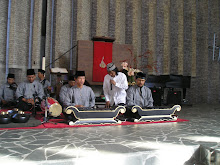
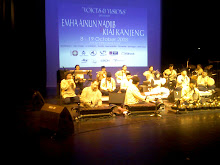

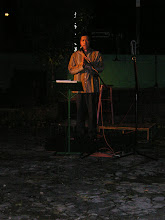



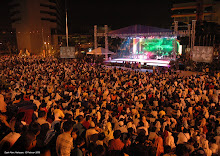
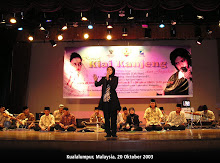
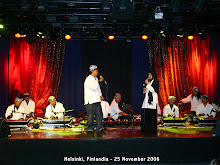.jpg)



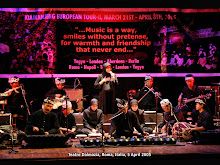


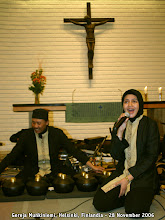.jpg)

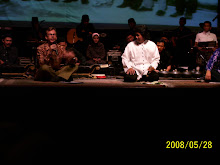.jpg)
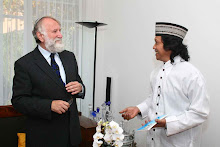
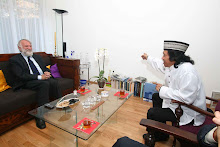
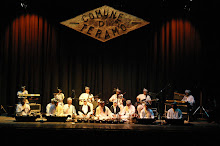


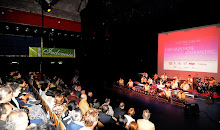

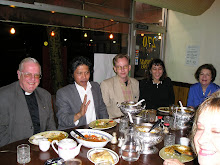


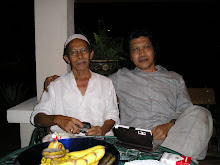
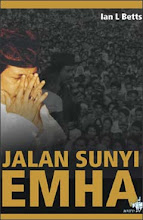
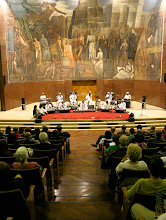
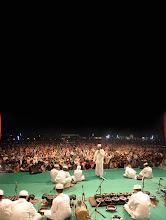

No comments:
Post a Comment